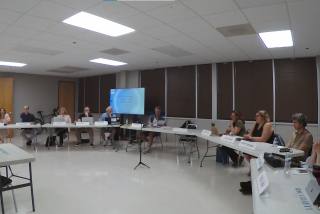Broken Sidewalk Signals Cracks in Board’s Organization
- Share via
Question: I live in an eight-unit association. I am one of the three owners who serve on the board of directors. There are several areas that are not being maintained properly. The sidewalk is lifting because of some tree roots, and the wrought-iron gates are so rusted that they need to be welded.
The president just resigned, is moving out of the area and has listed his unit. The other board member is not concerned about termite abatement and other association responsibilities.
I am trying to be a good board member but I can’t get the other board members to do anything. Should I resign?
Answer: The sidewalk problem is an insurance risk that should be corrected immediately before someone is injured. First, you should get the other board member to assist you in getting the sidewalk repaired. Then you can deal with replacing the person who has resigned.
Your association bylaws will explain how to replace a board member. Usually, the remaining board members have the authority to appoint a person who will finish out the term of the retiring person. Some bylaws require an election to replace a board member. Then the board elects their officers.
Perhaps you can find someone to serve who understands the fiduciary responsibility of caring for the building as you do. I don’t think you should resign unless there is a lack of support and cooperation from the other owners. In a small association, all of the owners should be willing to serve on the board when needed. That is the best way for the owners to protect their investment.
The owners should support the board in adopting a budget that is sufficient to maintain the property, and also set aside reserve funds for the future repair and replacement of the common areas.
Put Pressure on Owner to Quiet Noisy Renters
Q: One of the owners in our association has rented his unit to tenants who have noisy arguments that disturb the neighbors. We have asked the association’s board of directors and management company to enforce our rules that prohibit excessive noise. The association has fined the owner for the behavior of her tenants in the past. The police have been called numerous times. What else can we do?
Can the association evict the renter? Can the association continue to penalize the owner?
A: Your rules include the association’s procedure for levying monetary penalties. Each time the tenants disturb the other residents, the neighbors should issue a written complaint to the board and management noting the date and time of the disturbance. If you have on-site security personnel, they can document your complaints.
In most associations, management will send out citations as directed by the board. The association has no contractual relationship with the tenants, so the association should be dealing with the owner of the unit. The board could consult with the association’s attorney regarding the proper procedure to follow; however, I can suggest a procedure that may be effective.
A letter should be sent to the owner and a copy of the letter should be sent to the tenants. The letter should state the date and time that the alleged violation took place and cite the section, paragraph or page number of the governing documents that pertain to the violation. Request that the owner attend a board hearing, and state that the violation may result in a specific amount of monetary penalty if the owner does not respond.
If your governing documents establish the procedure and schedule for notice of the hearing and the specific penalty involved, the board and management company should carefully follow those procedures. The owner is entitled to have reasonable advance notice. If the owner is unable to attend, he should respond in writing to ask for a postponement of the hearing. The board should honor the owner’s request and work with the owner to find a solution to the problem.
The board should not view the hearing process as a means of discipline but rather as a means of learning how the owner is going to deal with the problem. Monetary penalties can be levied at the hearing if the owner fails to appear and fails to respond to the hearing notice. The owner is obligated to pay the penalty unless the amount is unreasonable.
The association is required to distribute the amount of penalties that are charged for specific infractions. Unpaid penalties can be added to the owner’s assessment billing statement, or Small Claims Court is an option.
Each time the tenants cause a disturbance, this procedure should be followed. It is time-consuming and frustrating, but it is effective in getting the owner’s attention.
The owner, not the association, has the power to evict the tenant depending on the wording regarding eviction that appears in the lease. So the association must prove to the owner that the tenants’ behavior is a serious problem. If citations and penalties are ignored, a letter from the association’s attorney is usually effective, because the attorney’s fees can be passed on to the owner.
Some associations have provisions in the declaration of covenants, conditions and restrictions (CC&Rs;) that require a standard lease agreement between the owner and the tenant that spells out the tenant’s obligation to abide by the governing documents, which includes the declaration, bylaws and rules and regulations. Even with that provision in the lease, it is still the owner’s responsibility to evict the tenant if problems arise.
Consultant Can Assess Need for New Roof
Q: Our association has spent thousands of dollars on roof repairs. We still have serious leaks but the roofing company will not guarantee its work. It will only guarantee the work if they completely re-roof the building.
Some of the board members have obtained bids for a new roof but we aren’t sure that a new roof is necessary. The bids vary greatly in cost and scope of work.
A: This is a big decision for your association. A new roof is usually a very large expenditure. No one should expect the board members to be roofing experts. I recommend that you contact some independent roofing consultants, and select one who will examine your existing roof and write detailed specifications for the necessary work. Then you can obtain competitive bids from several roofing contractors based upon the written specifications that the consultant provides.
An independent roofing consultant is an objective third party who provides professional advice but does not perform the work. The consultant can be hired to oversee the work of the roofing company that is selected to do the work. Sometimes the manufacturer of the roofing material will supervise the roofing work to provide a manufacturer’s warranty.
The consultant saves the board members’ time and energy and sometimes prevents the association from making a disastrous and costly mistake.
*
Jan Hickenbottom is a community association management consultant and a founding director of the California Assn. of Community Managers. She selects questions of general interest for the column and regrets that she cannot respond to all questions. Send questions to: Condo Q&A;, Private Mailbox 263, 4790 Irvine Blvd., #105, Irvine, CA 92620-1998.
More to Read
Sign up for Essential California
The most important California stories and recommendations in your inbox every morning.
You may occasionally receive promotional content from the Los Angeles Times.






